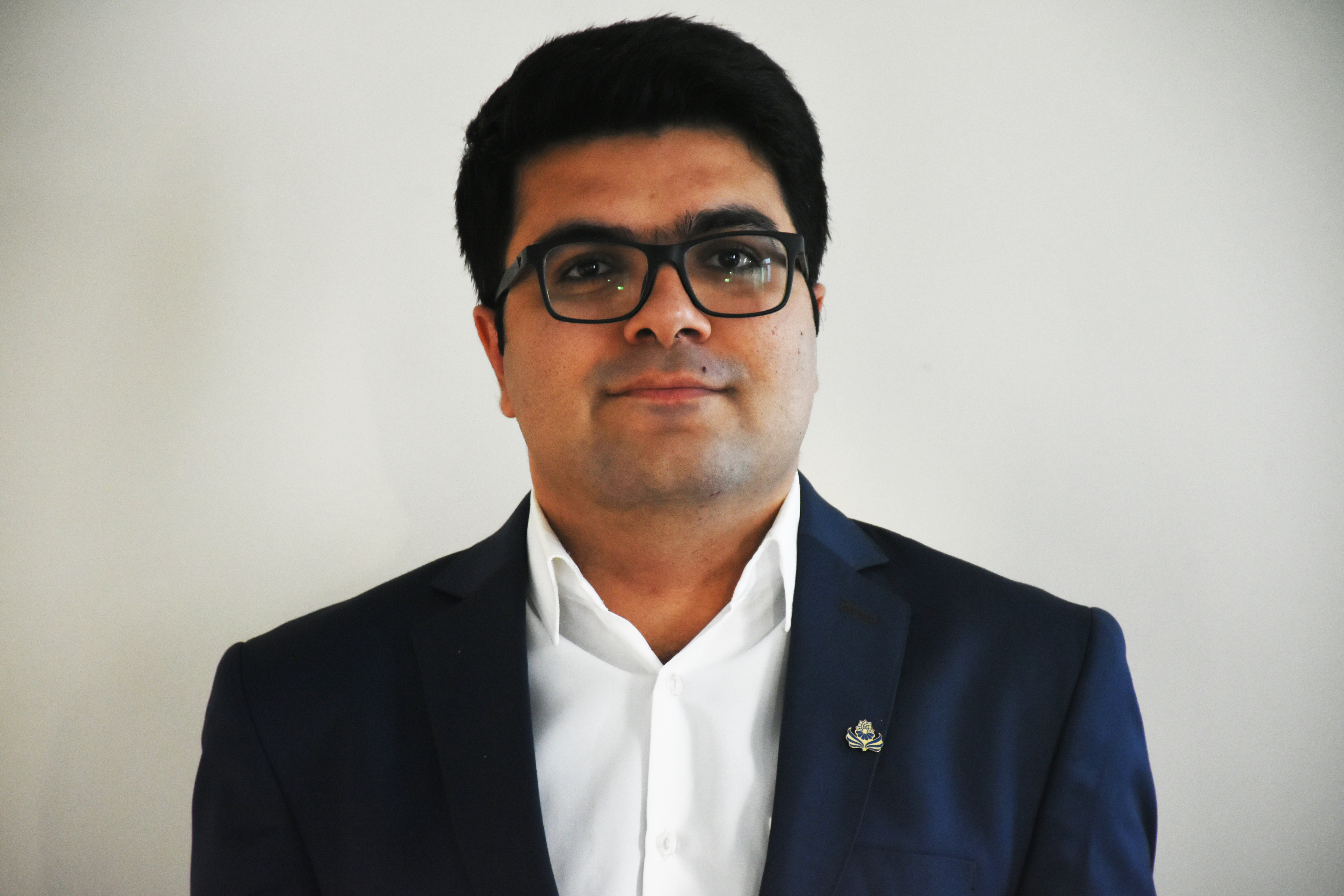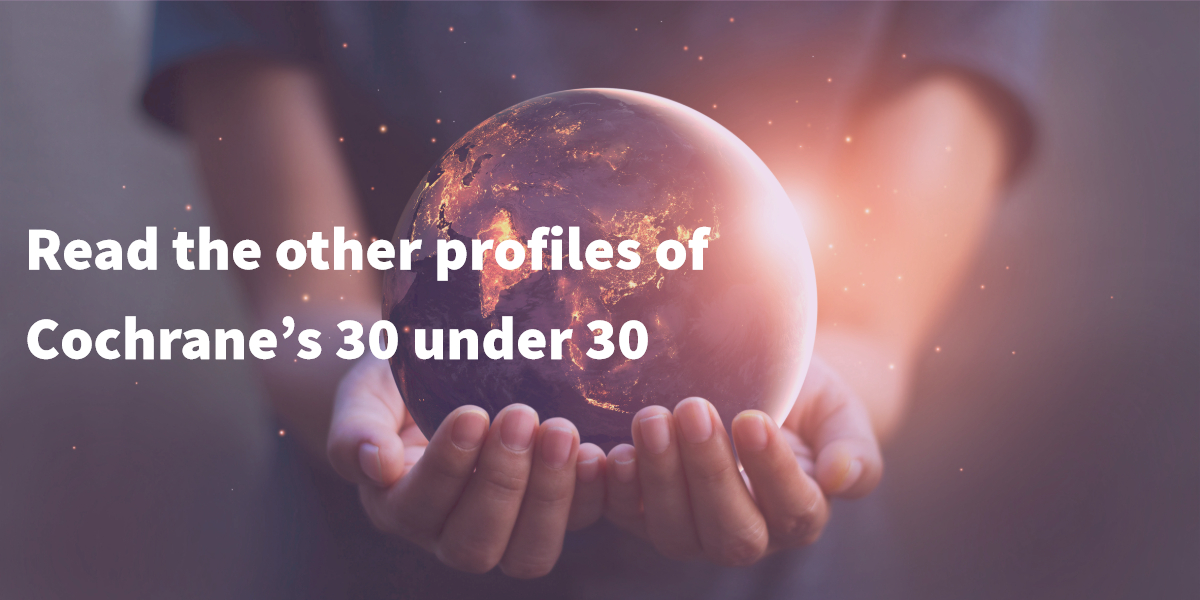
Cochrane is made up of 11,000 members and over 67,000 supporters come from more than 130 countries, worldwide. Our volunteers and contributors are researchers, health professionals, patients, carers, people passionate about improving health outcomes for everyone, everywhere.
Cochrane is an incredible community of people who all play their part in improving health and healthcare globally. We believe that by putting trusted evidence at the heart of health decisions we can achieve a world of improved health for all.
Many of our contributors are young people working with Cochrane as researchers, citizen scientists, medical students, and volunteer language translators and we want to recognize the work of this generation of contributors as part of this series called, Cochrane’s “30 under 30."
In this series, we will interview 30 young people, 30 years old or younger who are contributing to Cochrane activities in a range of ways, all promoting evidence-informed health decision making across the world.
We will be hearing from them in a series of interviewees published over the coming months.
We're keen to hear from you. Would you like to take part in this series? Do you know someone you'd like to see interviewed? Contact lparsonson@cochrane.org. Or if you want to know more about Cochrane’s work contact membership@cochrane.org where our community support team will be happy to answer your questions.

Name: Ahmad Sofi Mahmudi (on Twitter: @ASofiMahmudi)
Age: 25
Occupation: Dental Student at SBMU
Program: Translation Manager at Cochrane Iran
How did you first hear about Cochrane?
When I was in the second semester in college, one of our lecturers in dental school introduced Cochrane as a reliable source of evidence. That said, I must admit I did not fully appreciate what Cochrane does and provide.
How did you become involved with Cochrane? What is your background?
Two years ago, I started a project named “Dahaan” (meaning Mouth in Persian). Dentistry in Iran is primarily carried out privately. There was a clearly a lack of organized effort from the dental community to the public. We were a group of enthusiastic students who spotted this and decided to fill in the void by providing evidence-informed oral health material. Our first major project was the translation of Public Health England evidence based toolkit titled “Delivering better oral health.” Once I engaged in this project, I become aware that Cochrane systematic reviews have been frequently used and cited across this toolkit. This was an enlightening moment which intrigued us to look into Cochrane Oral Health systematic reviews. We were particularly keen on translating plain language summaries. Two months later, I came across an advertisement by Cochrane Iran inviting volunteers. Luckily, I was given a chance to be part of the Cochrane community by Dr Mesgarpour who serves as the co-director of Cochrane Iran.
What do you do in Cochrane?
Currently, I am a member of Cochrane and the manager of volunteer translators group of Cochrane Iran. We translate a variety of texts and podcasts.
What specifically do you enjoy about working for Cochrane and what have you learnt?
Before joining the dental school, I was passionate about programming. I would describe myself a GNU/Linux enthusiast. The GNU/Linux is a category of operating systems that has its own community and culture. In that community, everyone is ready to help others. This is something I appreciated and enjoyed. When I became a member of the Cochrane family, I realized that there is a similar culture in the Cochrane community. Cochrane members were willing to help each other in every aspect of the research process. In the end, everyone benefits from the result of the research. In the last two years, I have learnt a lot on how to conduct high-quality research and the criteria for evaluating the researches.
What are your future plans?
Alongside working as a dentist and treating patients, I wish to pursue my postgraduate studies health sciences. That being said, I will continue my collaboration with Cochrane as this has allowed me to view dentistry and health sciences in a different way.
In your personal experience, what one thing could Cochrane do better to improve its global profile?
I think we need to make sure that our outputs are easy to understand. Also, we need to actively engage an advocate for conducting high quality randomised controlled trials. There are many unanswered questions in healthcare, so there are lots of opportunities for improvement.
What do you hope for Cochrane for the future?
I hope that Cochrane will answer many more questions in health.
How important is it that young people get involved in Cochrane? Why is this, do you think?
Cochrane, like all other communities, thrives on engaging younger people. I think this should be a high priority for Cochrane.
Every project and organisation needs new and young people to continue their desired pathway. Therefore, Cochrane needs new people and new ideas every moment. Besides, young people could benefit from the Cochrane community and learn a lot from excellent scientists.
What would your message be to other young people who want to get involved with Cochrane’s work but not sure where to start….?
Please give it a go. Explore Cochrane and enjoy science.


